#Agrarian Life
Explore tagged Tumblr posts
Text
Bride, 1970
A new bride has come, the palanquin has left. Those who’ve come late — the old viewers: grim. Brittle-finger mothers measure the skin of the girl. Her ornaments’ weight. Hair. Teeth. The onlookers grow. This new girl’s laugh — Tell me, tell me, ma, will she be tame?
Will she not blind our boy (for how long they themselves could)? But a new girl shall possess new new tricks! Carrying paddy from the paddy fields to the paddy pots, pots to the oven. Oven to the mill. The animals of the flower-bed night bathe the cattle, feed the cattle, smell of cow urine.
Love. Who calls its obtuse name? The clarinet calls. At the midnight play, Majnun bawls. The girl, too, weeps with him. Till her man appears. To bring her — to bed. Till the birds cackle, the sun appears. The girl wakes up to sweep the floor for another ten years. Now when the cowshed is clean, her daughter goes there to read.
(The poem was first published in the May 2023 issue of Poetry India: https://www.ethosliterary.org/poetry-india/may-2023-issue/poems-by-arun-paria)
#Poem#Poetry#Agrarian Life#Poverty & Education#Poverty & Love#Rural Bengal Life#Rural India#Rural South Bengal 1970#The Life of a Farmer Woman#Woman Marriage Emancipation
0 notes
Text
#reminded me of a lecture in college on 19th century victorian literature. mill on the floss i think. the professor spoke of how#agrarian society was in tune with temporal cycle of nature. seasons religious days tides etc. with the first industrial revolution saw a#dramatic shift in the human experience of time with clocks and timekeeping mostly for the time labourers spent toiling in factories#mentioned how time was now 'spent' rather than 'passed'; leisure was taken completely out of daily life. things became task-oriented which#kept on increasing. the factories would tamper with the clock to keep increasing the time labourers worked on the floor.#you can't tamper with the sun and moon now can you?#anyway this also brings to mind the demand for separate timezones in india#also brings to mind the concept of timesheets and how freelancers charge by the hour.#also brings to mind max weber's protestant ethic and the spirit of capitalism for some reason#i side with the luddites
23 notes
·
View notes
Text

"There could be no such thing as landed property originally. Man did not make the earth, and, though he had a natural right to occupy it, he had no right to locate as his property in perpetuity any part of it: neither did the Creator of the earth open a land-office, from whence the first title-deeds should issue."
– Thomas Paine, Agrarian Justice, 1797
#Thomas Paine#Agrarian Justice#1797#book quotes#quotes#quoteoftheday#book quote#life quote#beautiful quote#quote#quotable#ausgov#politas#auspol#tasgov#taspol#australia#fuck neoliberals#neoliberal capitalism#anthony albanese#albanese government#fascism#rent is theft#landlords are parasites#landlords are scum#landlords are leeches#landlords are bastards#landlords are the worst#fuck landlords#landlord insurance
6 notes
·
View notes
Text
I hate how bad caveman stuff is in...pretty much all media that features them? Its such an interesting time period to me because we know so so little but thats like...where everything began you know? You can do so much with that i mean fuck you can do ANYTHING but everyone just goes full racist mode it makes me fucking insane
#Roots of pacha is probably the only good thing that uses the cavepeople setting and its partially because its about the transition from#Nomadic life to agrarian life because i mean...its a farming sim sjhqjaakka#Anyways good morning everypony
5 notes
·
View notes
Photo

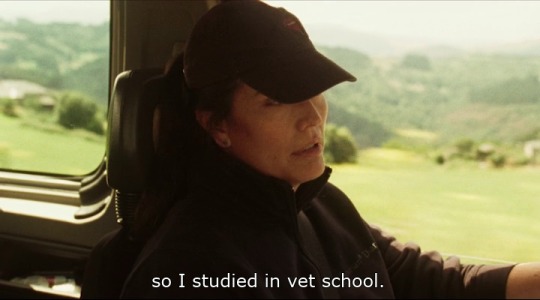
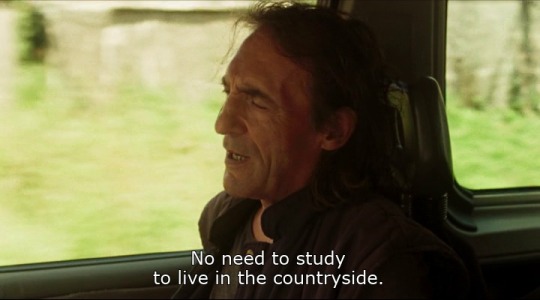
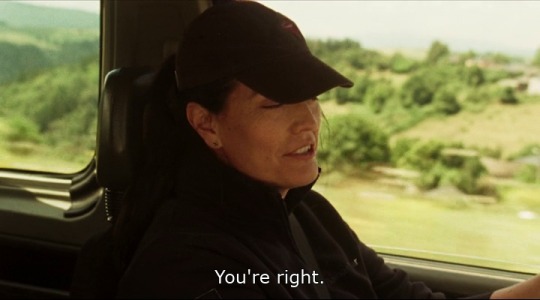
O que arde [Fire Will Come] (Oliver Laxe - 2019)
#O que arde#Fire Will Come#Oliver Laxe#Galicia#España#Serra dos Ancares#Spain#countryside#drama film#Lugo#Galician language#arson#forests#mountains#veterinarian#European movies#rural drama#normal life#agrarian#vet#mother son relationship#Navia de Suarna#small talk#Europe#driving a car
4 notes
·
View notes
Text
yet another thing i really like about dungeon meshi:
a lot of ink has been spilled on this idea that "people dont have autism/ADHD the problem is actually capitalism". usually paired with the notion that in agrarian societies being neurodiverget was actually super useful and that neurodivergent people would have been content with menial tasks like sorting berries or watcing over cattle, instead of the modern fallen state in which we find ourselves where we have to go to 9 to 5 jobs and sit in boring offices all day or whatever.
i wont rehash all the reasons this is clearly nonesense, instead what i will do is point out how brilliant ryoko kui was, yet again, for finding the way of eating her cake and keeping it too. dungeon meshi is clearly this power fantasy consisting of "what if your hyperfixation was actually extremely useful and was the thing that allowed you to thrive in this niche field". so in this case laios autism actually works almost as a superpower for him.
but then every single detail we come to learn about his past shows us how incredibly maladapted he was to the life he was born in. he couldnt meet his parent's expectations or those of his town, he couldnt fit in the army as a soldier, living on his own at a caravan he was malnourished, dirty, dressed in tatters and covered in fleas. and even after he manages to establish himself as an adventurer he gets constantly taken advantage by other people.
a lot of the reason why he is thriving in the story is because he is a) in the very specific niche of circumstances where his peculiarities actually are incredibly useful, in a dungeon filled with monsters where he doesnt have to deal with other people and b) surrounded by people who are either just as weird as he is or care about him deeply (or are consumate professionals like chilchuck)
8K notes
·
View notes
Text
It will also reinvigorate the Aryan blood and destroy the plans of ZOG 💪

(Why do reactionaries always try to tick all possible boxes and why was I the only person who instantly felt like something is off with cottagecore)
HALT!✋😐
did you remember to express gratitude for not having to subsistence farm today?
#i am not judging you if you like the aesthetic or prefer rural life but idealization of agrarian past is staple of fascists#so be aware and deal with this shit in your communities#politics
15K notes
·
View notes
Text
Was discussing Guilliman's Farm Thing and there's something I need to break down for y'all here.
Guilliman is not a farmer. Guilliman knows jack fucking shit about what life is actually like for a farmer, or any other working-class, or middle class, or non-aristocratic class person. Like I am 100% certain he has read tons of statistics and books and whatnot but that is very different from actually living the life.
Guilliman is a chronic overachieving workaholic who was forced one (1) time to take a vacation when he was briefly stranded on an agrarian planet during an especially stressful time in his life, and he enjoyed that break so much that he has spent the rest of his life fantasizing about it. Has he ever taken a vacation since? No. Has he even realized that what he really wants is the peace and quiet of a vacation rather than the """"""""simple""""""" (FARMING ISN'T SIMPLE YOU COLOSSAL FUCKWIT) life of a farmer? Also no.
Guilliman is a very, very smart person who is, on occasion, a giant fucking dumbass. Thank you and good night.
Edit: lemme clear some things up—I’m not talking about Guilliman’s actual capabilities here. I’m talking about him treating agriculture like a fun getaway, rather than actual work. There’s a long history of wealthy/powerful people romanticizing the simple pleasures of rural life without ever getting their hands dirty. IMHO that’s a stupid fucking take. Labor is labor, whether urban or rural. THAT’S why I emphasized that farming isn’t simple. It’s work, not a vacation.
TBH, I was being kinda unfair to Gman here. We all have fantasies where we save the day, or tell our bosses to fuck off after winning the lottery, or devastate our rivals with comebacks so good that everyone else applauds. I’m just really burnt out on people taking Guilliman’s Walter Mitty fantasies seriously. Dude doesn’t actually want to be a farmer, he wants a vacation.
#warhammer 40k#roboute guilliman#i say this with affection#but also#don't encourage the dumbassitude#man needs to learn to take a break
562 notes
·
View notes
Text

Someone whose work I greatly appreciated and would suggest you (oh dear reader) seek out and read. In simplest terms, Scott explored the avenues in which people resisted and evaded authority and hierarchical systems of control. A good part of his scholarship involved trying to understand peasantry, one the largest "classes" in the world. Coupled to that was the study of subsistence economies and how people involved in those economies work around impositions made by State actors (and non-state actors). This led to a larger exploration of the above mentioned resistance and the various forms that this resistance took around the world. He also explored the relationship between State and non-state peoples. "What I learned is that centralised revolutionary movements have almost always resulted in a State that was more oppressive then the ones they aimed to replace. In other words, when the revolution becomes the State, it becomes my enemy again. That is why it matters greatly which methods are used in order to achieve power. .... "I am the enemy of hierarchical movements of opposition because I think they replicate State structures in their own organisation."
If you would like some suggestions that offer a peak into Scott's scholarship interests (which are similar to my own), here's some videos for you to peruse (if you have the time): 1. A Short Account of the Deep History of State Evasion 2. Beyond the Pale: The Earliest Agrarian States and “their Barbarians” 3. The Art of Not Being Governed 4. The Domestication of Fire, Animals, Grains and…….Us (Later) Edit: Some revelations concerning Scott's involvement with the CIA in the early 1960s in their anti-Communist activities has come out after his recent death that complicates his legacy as a "radical scholar". Take that for what you will. I haven't been able to find a great deal of detail about that involvement and the revelations here aren't exactly new but people have decided to highlight that relationship in the wake of Scott's passing as a way to discredit or cast a shadow over his later anti-statist research. I just wanted to note this. (Even Later) Edit: The Oral History Center at UC Berkeley released a documentary on Scott called In A Field All His Own: The Life and Career of James C. Scott. Just in case you wanted more Scott related material.
#James C. Scott#seeing like a state#the art of not being governed#anarchism#academia done right IMO#history#anthropology#social history
450 notes
·
View notes
Text




In the future Aurora has a much more hidden life from everyone, she raises her children in a small house in Gifu Prefecture, an agrarian and traditional area of small villages, with a very low profile. The main objective is to hide Ryoma. She is finally happy at this stage, even though barely a handful are left by her side, she strengthens herself in the company.
161 notes
·
View notes
Text
Indian tea production has been in severe crisis since the mid nineties largely due to neo-liberal structural adjustments in the Indian economy. The size of the tea industry, which is second only to China and accounts for 25 percent of global tea production, has made this a huge blow to the country’s agrarian economy. The industry employs 1.26 million people on tea plantations and two million additional people indirectly. As such, the economic crisis has had an enormous impact on the lives of local residents. In Kerala where I have been conducting research, there have been eight cases of suicide and twelve deaths due to starvation on tea plantations since 2001. Along with utter poverty and famine, tea plantation workers have faced increasingly unhygienic work environments, shattered social life/community relations, and withdrawal of the welfare measures previously enjoyed. The crisis punctured the isolated environments of the plantations and precipitated neoliberal reforms that closed down production in many areas either partially or completely. While many families remained on the plantations, large numbers of workers who had lived there for more than five generations were now compelled to seek work outside. Some went with their families to either their ancestral villages or regional industrial townships such as Coimbatore and Tirupur in Tamil Nadu. These plantation workers have now joined the ranks of the massive Dalit workforce powering India’s unorganised and informal sectors. In joining that pool of workers, Tamil Dalit labourers are exposed to aspects of a caste-ridden society from which they had previously been shielded. The situation of Saraswathi, a female retired worker in her early sixties, illustrates the dilemma and struggles of the workers who moved out the plantations.
— The hidden injuries of caste: south Indian tea workers and economic crisis by Jayaseelan Raj
#plantation tamils#kerala tea plantation#kerala#idukki#neocolonial india#neoliberalism#neoliberal india#plantation capitalism#plantation neoliberalism#tamil dalit workers#neoliberal casteism#jayseelan raj#tamil nadu#tamil labour migration
182 notes
·
View notes
Text
I know I spent two days without posting any lesbian pride post lol but I swear I'm gonna post two posts per day in the following days to make up for it. I am again going to talk about an artist, but from a different period this time.
Rosa Bohneur !
(I love her name by the way... Bohneur means happiness in french and that's such a pretty name to have)
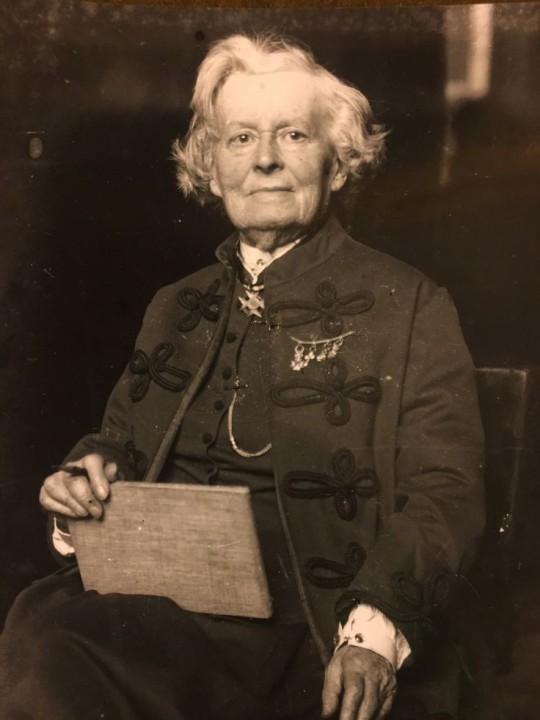
Marie-Rosalie Bonheur, known as Rosa Bonheur, was born in 1822 in Bordeaux and died in 1899 in Thomery. She was a French painter and sculptor specialising in representations of animals.
She has kind of an interesting family story (mother adopted by a rich guy who found out later who was her real father, siblings all artists, father who met a lot of interesting people, links with many famous people...) but it would be too long to talk about it and I want to focus on Rosa herself. Do check it up if you're interested!
During her youth, Rosa Bonheur had a reputation for being a tomboy, a reputation that followed her throughout her life and which she made no attempt to deny, wearing her hair short and later smoking cigarettes and cigars. Her emancipated lifestyle never caused a scandal, even though she lived in an era that was very concerned with convention. Like all women of her time, Rosa Bonheur had to apply to the Prefecture of Paris for a cross-dressing permit, renewable every six months, in order to wear trousers, in particular to attend livestock fairs, travel or ride horses.
Here's one of her permits, from 1857 :
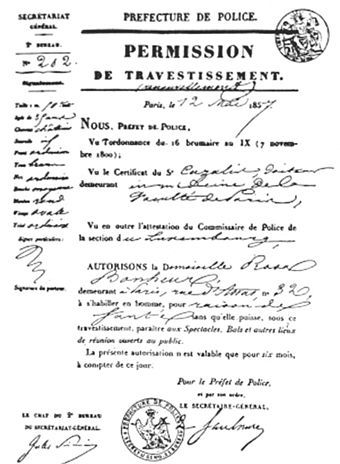
And though many historians tried to deny the fact that she was a lesbian, she always refused to marry a man, has only ever had relationships with women and literally wrote that she never felt any sort of love, attraction or tenderness for men, "besides a frank and good friendship for those who had all my esteem". After the death of the woman she loved, she also wrote "If I'd been a man, I'd have married her, and they wouldn't have made up all those silly stories..." You got it : even if she didn't shout it from the rooftops, Rosa was very probaby a homosexual woman.
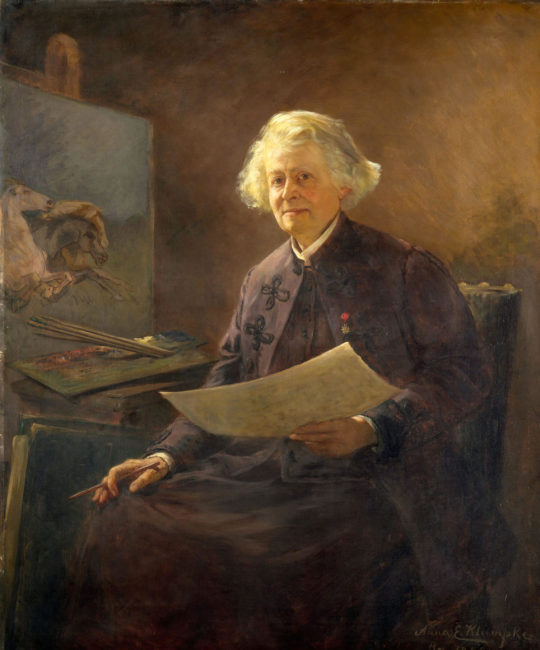
Rosa Bohneur grew up in a fairly wealthy family, thanks to the financial support of her mother's adoptive father. But when her mother's father died, the family was left without any such support, and fell into dire poverty. When Rosa was 11, her mother died, which deeply traumatised her. She kept a lifelong admiration for her mother.
In 1836, at the age of 14, she met Nathalie Micas, who became her lover. Only Nathalie's death 53 years later separated them.
Her father remarried in 1842 to Marguerite Peyrol, with whom he had a last son, Germain, who would also become a painter. Rosa Bonheur did not get on well with her stepmother and when her father died in 1849, she left the family home to live with the Micas.
After her mother's death, Rosa Bonheur went to primary schools, was apprenticed as a dressmaker and then went to boarding school. Eventually her father took her into his workshop, where her artistic talents were revealed. He was her one and only teacher. Gradually, she developed a passion for animal art, which became her speciality.
She exhibited for the first time, at the age of 19, at the Salon of 1841. She won a 3rd class medal at the Salon of 1845, and a 1st class medal (gold) at the Salon of 1848. This award enabled her, at the age of 26, to obtain a commission from the State to produce an agrarian painting (paid 3,000 francs). The painting resulting from this state commission, "Labourage nivernais" was supposed to go to the Musée des Beaux-Arts in Lyon. But it was so successful at the 1849 Salon that the Beaux-Arts department decided to keep it in Paris, at the Musée du Luxembourg. After Rosa Bonheur's death, the work went to the Louvre, before being transferred to the Musée d'Orsay in 1986.
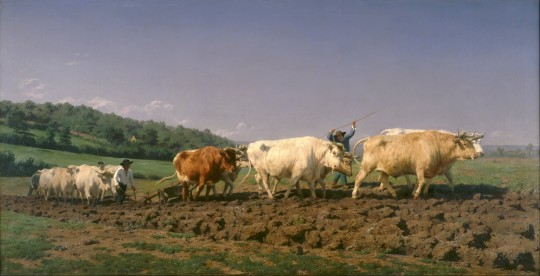
When her father died in March 1849, Rosa Bonheur replaced him as director of the École impériale gratuite de dessin pour demoiselles (or École gratuite de dessin pour jeunes filles). She remained in this position until 1860: ‘Follow my advice and I'll turn you into Leonardo da Vinci in skirts’, she often told her pupils.
In 1860, she moved to a huge house in By, where she had a huge workshop built, and ample space for her animals. One of her relatives wrote: “She had a complete menagerie in her house: a lion and a lioness, a deer, a wild sheep, a gazelle, horses, etc. One of her pets was a young lion she let run around. My mind was freer when this leonine animal died".
In June 1864, Rosa was visited by Empress Eugenie, who invited her to lunch at the Château de Fontainebleau with her husband. The following year, Eugenie returned to see her, to present her with the Legion d'honneur herself. Rosa is the ninth woman and the first artist to receive this distinction. About this, The Empress said :
“At last, you've been knighted. I am delighted to be the godmother of the first woman artist to receive this high distinction. I wanted the last act of my regency to be devoted to showing that, in my eyes, genius has no sex."
She was also the first woman to be made an officer in this order, in April 1894 (first female officer of the Legion d'honneur).
Rosa traveled extensively with her lover Nathalie, herself a painter and mechanical enthusiast (she invented and patented a railway braking system), and painted many pictures inspired by her travels.
In 1889, Nathalie died after some 50 years together. It was then that Rosa expressed her regret at not having been able to marry her.
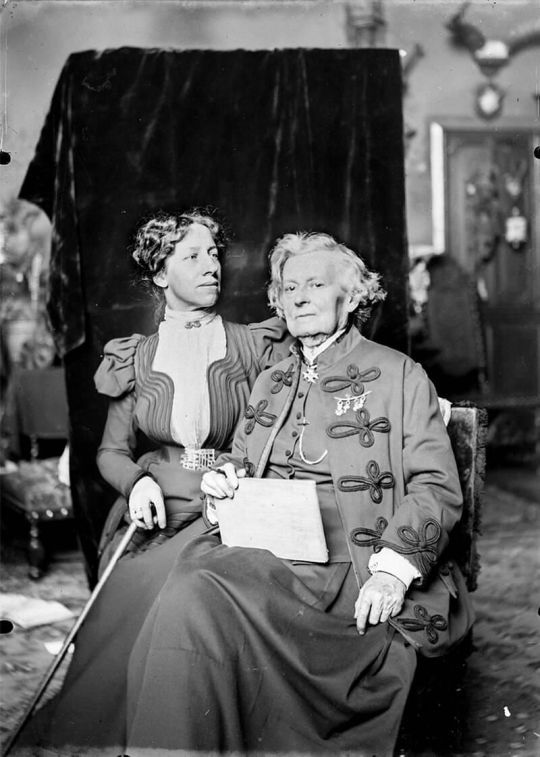
After Nathalie's death, Rosa met Anna Klumpe, a talented American painter. The two women moved in together some time later.
Rosa Bohneur died of pulmonary congestion in 1899, without having completed her last painting, “La foulaison du blé en Camargue”, a monumental canvas she had planned to exhibit at the 1900 Universal Exhibition.
She is buried in Père Lachaise cemetery, alongside Nathalie, her parents and Anna (who died years after her). She left her entire fortune to Anna, who, in 1908, published a biography of Rosa Bonheur and created a Rosa-Bonheur prize at the Société des artistes français. The Société des Artistes français posthumously awarded her the Medal of Honor shortly after her death.
Rosa could have had military honors at her funeral, but she specified in her will that she did not wish this.
There's a lot of interesting things to say about Rosa, her art and her history, so I suggest you do some research on her! She was a very talented and strong-willed woman who had a huge impact on French art and left a considerable cultural legacy.
Here are some of her paintings :

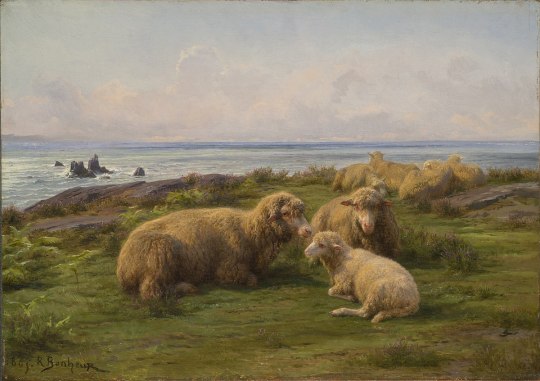


I personally love them ! I am not a painting expert, I just find them sooo pretty.
See you tomorrow :)
#lesbian#lesbian pride#pride#pride month#female homosexual#female homosexuality#rosa bonheur#french art#painting#art#lesbian history
215 notes
·
View notes
Text
After the victory of the Red Army and its occupation of the eastern third of Germany, large landowners, mainly the ‘Junker’ class (the landed aristocracy that had traditionally been a pillar of support for German militarism), were expropriated and the land distributed to landless peasants and small farmers. In September 1947, the Soviet military administration announced the completion of agrarian reform throughout the Soviet zone. The report listed 12,355 estates, which had been seized and redistributed to 119,000 landless farmers, 83,000 refugee families, and some 300,000 agricultural labourers. But many new farmers soon found that the acreage of the individual pieces of land given to them through the land reform was not large enough to provide a decent living; and often the new farmers did not possess the expertise or the machinery to work the land efficiently. The government therefore supported the idea of co-operatives. [...]
One of the big advantages of agricultural co-ops was that individual farmers and labourers had, for the first time, a fixed working day, guaranteed holidays and the possibility of retirement without the worry of what would happen to the farm. The co-ops would organise the cultural life in the village, support its members in building homes and in gaining qualifications. It also provided childcare and holiday places. [...]
During the lifetime of the GDR the percentage of citizens living in the cities with over 100,000 inhabitants barely rose. The increasing use of technology and modern techniques on the farms also made the work more attractive to young people and helped retain them in the countryside. It is significant that the number of members in the co-ops increased over time because young people became members, no longer leaving at the first opportunity for the towns (in the 1980s, membership of co-ops increased by more than 10%).
It was also a fact that the per capita production figures of most co-operatives were better than those of individual farmers in the West. The co-operative principle, particularly in the agricultural sphere, demonstrated that it could offer a third way between the often barely economically viable family farms and industrialised farming, which has been responsible for the destruction of social structures and the rural environment in many countries.
After unification, when the whole economy was privatised at break-neck speed, the co-operatives came under enormous pressure. However, the main reason they could challenge the threatened expropriation was that the farm workers and not the state owned the land. This meant it could not legally be taken away from them and they could make their own decisions as to what to do with it. Because of their positive experience working in the co-operatives, the vast majority of farmers did not want a return to individual farming. However, the co-ops had to battle against discrimination anchored in Federal German law that favoured individual over collective ownership. In addition, they suddenly faced imposed fictitious debts that were near impossible to pay in the changed economic circumstances. As a result, many co-operatives were forced to give up. Today only a few survive and about 80% of the jobs in agriculture have been lost.
Stasi State or Socialist Paradise? The German Democratic Republic and What Became of It by Bruni de la Motte & John Green with Seumas Milne (Contributor), 2015.
100 notes
·
View notes
Text
THE KNIFE OF MUAD'DIB (Paul x OC!Reader x Chani)

Wherein na-Duke Paul Atreides is not the Bene Gesserit's only prospect for the Kwisatz Haderach. Raised by Paul's side as his playmate and servant, Chryse, the Bene Gesserit's cuckoo child, will forge a new future for her master.
(previously posted on AO3 as Themis)
PART I: JESSICA
Lady Jessica focused her intent gaze on the Reverend-Mother’s... gift. This gaze, to which the minutiae of observation was second nature rather than practiced pretense, followed the lines of the girl-child’s high cheekbones up towards large eyes that appeared to overwhelm the face they were set in.
She’d seen that look in those eyes before. Perhaps a thousand times over, a million times over. Reflected in the mirror back at her on Wallach IX, reflected in the shadowed eyes of the girls she barely remembered. The girls that one by one fell, until amongst a hundred girls there stood five Bene Gesserit.
Jessica’s skirt rustled against the floor as she stalked closer, circling the child, examining every angle.
How interesting.
Such control in the child’s bearing, belied by such fear.
Paul had always been fascinated with off-world animals in the filmbooks; the agrarian creatures that inhabited Caladan for over twenty generations bore no thrill to her clever son. Jessica had never understood his fascination as the filmbooks rendered such organisms dead to her. Mere simulacrums of life with soulless eyes.
Perhaps one such simulacrum stood before her now in the form of a human girl. “Reverend-Mother, does she have a name?”
“We call her Chryse. However, if that name does not suit you, Jessica, you may name her as you wish. It is of no consequence to us.” Reverend-Mother Mohiam’s demeanor certainly hadn’t changed in the slightest from the days when she served her overtly. When Gaius Helen Mohiam spoke, everything from her inscrutable countenance to the even tones of her voice commanded subservience. “You will not harm nor bring harm to the girl-child. It is our one order.”
Jessica watched as Mohiam brushed her fingers against Chryse’s jaw to tilt her still face up towards the sallow light of the glow-globe. Not even a muscle twitched in her smooth facade. Jessica wondered what sort of chaos lay beneath, whether the girl would be like the jagged rocks under the beckoning surface of Caladan’s oceans. Only a fool would dive into the dark water blindly.
There was no other option but to acquiesce. “You have my word. She shall not come to harm under my care or the care of House Atreides.”
“Good.” A look passed between them, lasting only a second. Within that second lay an eternity.
The Reverend-Mother strode from the room with an economical gait, not sparing another iota of energy to look back.
Jessica knew then the precise nature of this “present”.
How many men had failed in the making of the Kwisatz Haderach? How many years, decades, centuries had her sisters carefully tended the most sacred plant, a mind that could bridge space and time. If Paul failed -
She stopped that fearful thought in its tracks, held it in the cradle of her mind’s eye, then let it pass through.
The Bene Gesserit were patient like mountains were patient. Time was an endless resource. It was better to cultivate many plants of good stock than to nurture a small garden and watch as its leaves shrivel and diel. Chryse was not and could never be the Kwisatz Haderach. Perhaps that fact ought to have assuaged Jessica’s fear. Yet - if Paul should die while he was only eleven, the House of Atreides forever extinguished, the child seemed poised to become the next vessel to carry the bloodline of the Kwisatz Haderach. Only ten years old, and she had mastered the prana-bindu like an adept three times her age. Who knew what sort of terror she had been bred to create?
Her son had already shown promise even without her training. Paul might flourish, grow into a man, grow into the mind that the universe needed. That would never come to pass if Chryse supplanted him.
Mohiam must have felt some minute degree of affection towards Jessica. If she hadn’t, the Reverend-Mother would not have left the girl in her care. The blade was double-edged; the Bene Gesserit cared not for which of the two survived, only that one of them did. Motherhood had softened Jessica to the point where she felt some empathy for her poor charge. Not enough empathy to entirely stay her hand, but enough that she wanted the girl to live. Enough that she intended to lift the burden of killing her from Paul’s narrow shoulders.
“Come here, girl.” Once she was close enough that the Bene Gesserit-trained woman could stretch out a single, finely-boned hand and press her fingers to the weapon’s temple, she bade her stop.
Jessica brushed her mind carefully up against Chryse’s, wary of the mind traps the girl had surely been taught from birth.
There were no traps. Not even a token protest.
Chryse had fewer defenses than a newborn infant. Her mind was splayed out in the open; even the slightest whisper of Voice guaranteed complete obedience. The Bene Gesserit had truly forged a weapon of a girl. She hadn’t a psyche of her own - where there should lay a personality was instead filled with iron bars of mind conditioning. Jessica’s heart ached for her. No child deserved to live like that.
A moment passed wherein she further plumbed the depths of her mind. Jessica knew then that Chryse could never use a Voice of her own. The same breeding that had left her mind wide open had left her unable to Speak. But of what use to the lineage of the Kwisatz Haderach was a girl entirely unable to use the Voice and critically susceptible to it?
The vision came on suddenly, as the waves did against the shores of Caladan. A figure whirled amongst dozens of men as they fell to their knees. The lady knew those movements by heart even though they felt wrong. It was the Weirding Way, without a doubt. At the same time, every action was utterly alien. Chryse moved through the battlefield like a valkyrie of old with hands that created ruination with every twitch. Her deficit of Voice was more than made up by her complete mastery over the physical realities of others. Lungs collapsed inwards; hearts refused to beat; nerves froze. Blood. Oceans of blood.
Without meaning to, her fingers fell away from the girl’s temple in astonishment and the vision dissipated like morning mist.
The Kwisatz Mother had bred an abomination.
The laws of nature should have forbidden such a being from coming into existence. No doubt, she wouldn’t have without the careful guidance of the Bene Gesserit. What infinite combination of genes could produce a person who could bend human bodies to their will? A weapon to be wielded against the very molecules of anatomy? Chryse had quite a bit further to go before she would become the war goddess Jessica saw in her vision, but her raw talent remained a cudgel poised over Paul’s head and ready to end his life.
This was an unacceptable outcome.
Forgive me, Jessica thought; forgive me for what I must do. “You will never harm Paul Atreides. You will never allow harm to come to Paul Atreides. You will always remain loyal to him and never betray him in the slightest. You will lay down your life for him.” She swallowed down her guilt as she watched her Voice take root in the blank shell of the young girl’s mind. That Chryse was now freed from Bene Gesserit absolute control was a small consolation for the crime done against her. For Paul to live, this girl must be subjugated.
Her wide, dark eyes blinked. There it was - a tiny spark of life in her young, solemn face. Chryse was just a girl. A young one, at that. Innocent. Guilt ensnared Jessica’s heart and held it in a chokehold. The sisterhood had not completely uprooted her weak personality, but there was no doubt that their conditioning program left permanent scars. Jessica’s Voice would not have affected Chryse nearly as much without it.
The lady resolved always to be tender to the girl. At a minimum, she could improve the quality of Chryse’s life. Jessica told herself this as she called for servants to take the girl, bathe her, dress her, and prepare a chamber for her near Paul’s. Was it so selfish of her to want her son to live? At any cost? Paul’s new companion would always be treated well and never punished. There were worse fates. For the Kwisatz Haderach, the Bene Gesserit could commit any number of sins.
But Jessica knew her mind and herself. This was a blood debt that she could never repay.
Paul would be safe, and the girl’s powers would never be used against him. That would be her consolation.
-
Her palms smoothed over the muscled plains of Leto’s back. The Duke was her husband in all but name, and Jessica reveled in how he relaxed at her touch. At the school on Wallach IX, she’d learned everything but the warmth of trust and partnership built from deep, mutual love. There was no room in the lives of the Bene Gesserit for any kind of love besides the love of the sisterhood. It was this trust and love that had led Jessica to birth Leto a male heir instead of the daughters she’d been commanded to produce.
Leto reluctantly pulled himself away from her to pick through some papers strewn across his desk. “What’s this I hear about a new handmaiden joining our household?”
Involuntarily, Jessica inhaled. “Ah, my new charge. Chryse. An orphan, Bene Gesserit trained but not suited to the task. Reverend-Mother Mohiam, the Imperial truth-sayer, has entrusted her safety to me.” She kept her hands out of Leto’s line of sight so he couldn’t see the tension in her white knuckles. Ever so slowly, the lady exhaled. Again, guilt. The guilt threatened to consume her whole.
Her husband had always been far too intuitive for his own good. “She is young.” Sometimes a conversation with him was like playing chess. Every word, every tone, every movement playing off those of the other. Jessica enjoyed such a conversation far more when the stakes were not nearly as high. Perhaps he knew even subconsciously what she felt, what she had done.
Jessica let the silence in the air hang.
Leto sat at his desk, his brown eyes never leaving her smooth face.
She conceded first. “It will be some time before the girl will serve as my handmaiden in truth, but is she not of an age with Paul?” Not quite a lie, not quite a truth. A certainty presented as a question even though she had already decided the answer.
With no other child from her in sight and no political marriage alliance contracted to provide others, her son remained at the forefront of his father’s concerns. “Paul must keep his attention turned towards his lessons. I trust you, Jessica. He cannot be distracted.” Leto was known to others as inscrutable and honorable. She could read every emotion that flickered across his handsome face. He was worried; that much was plain. He was worried about what the legacy he’d built and the enemies he made might do to his kind son. His only son.
Even though he would never know it, the solution to his worries was close at hand. “My love, every child needs a companion. There are no children of an age with Paul on Caladan and certainly none suitable for his station. I’ve seen his loneliness. I know you have too.” The truth in her words was undeniable. Only eleven years old, and Paul had never known a friend his age on Caladan. He glued himself to his filmbooks and the stories of Duncan Idaho and Gurney Halleck. Leto cared for more than just raising an heir. Jessica knew he loved Paul. He worried about his well-being. Her husband would grant her this wish. Check.
“What better place for a friend than a girl in his mother’s service? They won’t have to be parted for quite some time. And there is no better judge of caliber than the Bene Gesserit.”
His resigned sigh echoed in the quiet of his study. Checkmate. “You’re right.” Leto’s footsteps as he got up and drew closer to her were a comforting rhythm. She knew that rhythm by heart.
“I do tend to be.” The impulse to feel the rhythm of his pulse beneath her hands overtook her, and she let it. Jessica reached out to press herself to him. Her Duke responded in kind as he gently drew her arms around his neck and brushed his forehead against hers.
It was more than enough sometimes to breathe in the same air as her beloved. To know that she shared space, time, and life with him.
Leto pressed a kiss to her mouth. Without any further words, he left the room.
Her fingers pressed against her closed eyes as if to alleviate the burden she’d taken upon herself. All of this would be justified in the end. Jessica had to keep faith in that.
Reposting this unfinished dune fic i started during the 1st movie and orphaned on ao3! Seems as if there's interest. LMK if you want on the tag list.
#dune#the dune books#dune books#dune movie#dune 1#dune part 1#dune part 2#paul atreides#chani#paul atreides x you#paul atreides x reader#timothee chalamet#lady jessica#paul x chani#paul atreides x chani#paul atreides x you x chani#dune fanfiction
336 notes
·
View notes
Text

Everyone: “Cliff please save us!”
Cliff: “Fear not, for I shall indeed deliver you from this turmoil. By embracing the agrarian way of life, you will find solace and purpose. Through the act of farming, you will connect with the earth, attuning yourselves to the natural cycles of growth and renewal. This harmonious existence will bring you peace and fulfillment, allowing you to adapt and thrive in ways you have yet to imagine. Name all the animals after me!”
56 notes
·
View notes







